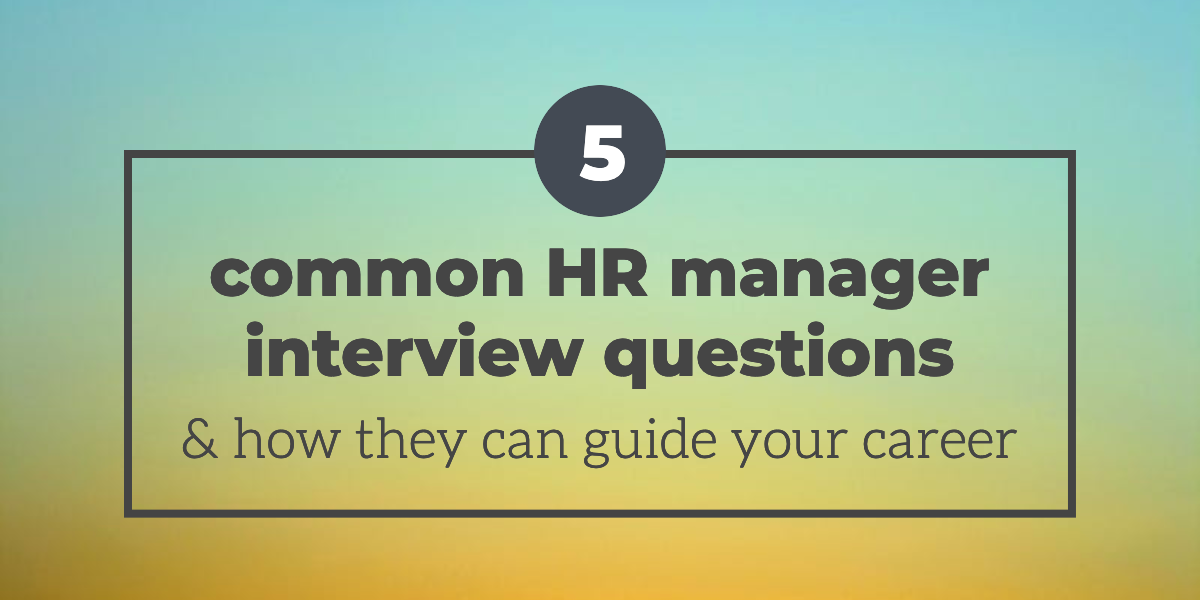.png?width=1200&name=5-common-HR-manager-interview-questions%20(1).png)
As an HR expert, your hiring decisions often hinge on a candidate’s performance in their job interview — especially when they’re applying for a leadership position. However, when it comes to your own career advancement, it can be challenging to determine what to say.
But, as you know, taking the time to research popular interview questions and rehearse thoughtful responses ahead of time can increase your chances of earning a coveted leadership position.
Whether you’re currently interviewing for a new role or simply considering pursuing new opportunities in the future, here are several popular HR manager interview questions and tips for formulating the best responses:
1. What is your greatest strength/greatest weakness?
A popular interview question you’ve likely used when evaluating candidates for a variety of roles, employers often use this to gauge a candidate’s self-awareness and prompt them to highlight their most relevant skills or abilities.
When sharing weaknesses, make sure to discuss how you’re striving to improve upon these areas of opportunity. For example, if your weakness is that you have difficulty delegating tasks, you might explain how you’ve streamlined internal processes to help feel more comfortable trusting assignments to other team members.
When talking about your strengths, it’s important to provide details about how you leverage your best skills to improve business outcomes. For example, if your strength is that you’re an excellent communicator, you might share how you used your interpersonal skills to moderate a disagreement between two employees and helped them reach a solution. With that said, it’s important to be as objective as possible and consider how your strengths actually impact certain business KPIs.
2. What is your management style?
In most cases, employers ask this question to determine if your style aligns with their organization and culture. For example, an autocratic or authoritarian style leader probably wouldn’t be well suited for a management role within a laid back, tech startup. Similarly, a Laissez-faire manager likely wouldn’t fit well within a highly-regulated industry.
Take time to consider your management style and discuss how it’s helped you achieve success in previous roles. For example, if you take a democratic approach to leadership, you might share how it’s helped you drive higher levels of employee engagement and mutual trust.
3. Discuss an ethical dilemma you encountered at work. What did you do?
As an HR professional, you’re often responsible for ensuring a company’s workforce is dedicated to upholding organizational values. But, as you’re likely aware, ethics aren’t always a black-and-white issue. For example, your company may frown upon employees taking personal calls during work hours, but what if a team member has an emergency at home?
When discussing your own experiences with ethics in the workplace, it’s critical you share your regard for an employer’s rules and values, labor laws and workforce support plan. Explain the thought process behind your actions as well as the outcome, and what you might do differently if you encounter a similar issue again.
4. Why do you think you would make a good HR manager?
Employers ask this question to assess whether you believe you have what it takes to succeed in HR management and why they should hire you instead of another candidate.
This question gives you the chance to highlight your best skills and provide concrete examples of your expertise. It’s also an opportunity to discuss why you’re passionate about human resources and how you’ve committed yourself to making a difference.
For example, you may explain that you’re an empathetic, intuitive person who enjoys helping other professionals recognize their strengths, or that you’re passionate about connecting people with the tools and opportunities they need to succeed. You might share how you’ve previously used your skillset to improve team performance, overcome departmental challenges and improve business outcomes.
5. What do you foresee as the biggest challenge facing human resources?
Often, employers may ask this question to evaluate whether you’re well informed or have any ideas or solutions to help their organization overcome current obstacles.
As an HR manager, it’s essential that you’re up-to-date on all of the most critical employment trends and HR industry challenges. After all, your organization will rely on you to ensure they’re prepared and meeting all compliance requirements.
Whether you’re an HR manager today or considering applying for a leadership role in the near future, it’s vital you stay abreast of employment policies and regulations, as well as any current events that may impact your organization or industry. Developing informed opinions and being able to explain your point-of-view eloquently is crucial for earning and succeeding in an HR leadership position.
Regardless of your level of experience, preparing for an interview can be challenging. By taking time to understand popular HR manager interview questions and developing thoughtful and engaging responses, you can make a positive impression on potential employers and advance your career to the next level.
